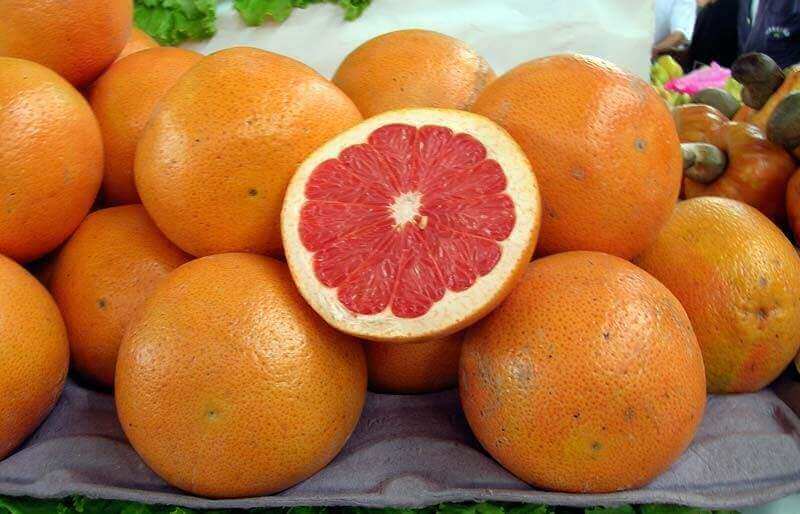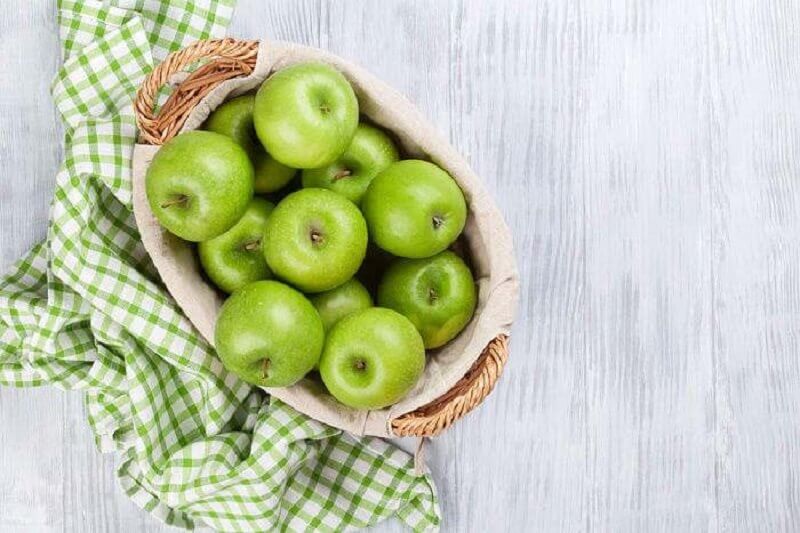The 7 Best Fruits to Detox Your Body at Christmas


Reviewed and approved by the doctor Gilberto Adaulfo Sánchez Abreu
It’s time to counteract the effects of toxins in the body during the excesses of the holidays. For starters, there are some habits that have been around for many years to detox your body. Luckily, you can detox your body with healthy fruits.
When your body is working around the clock to process excess toxins of food, sugar, and alcohol, you need to provide a surplus of nutrients to reduce the strain you’ve caused at the time. Fortunately, you don’t need to resort to strict plans or expensive supplements to deal with this problem.
Although your holiday diet might not be perfect, you can increase your consumption of certain healthy fruits that will stimulate your body’s natural detox.
Detox from Christmas excesses
Christmas parties are usually carried out with abundant meals that are difficult to digest on consecutive days and with many added extras: appetizers, desserts, sweets, alcohol, and spirits.
It may be that we even eat meals away from home, the fact of having guests, and all the changes that these 15 days tend to “force” you to change your eating habits, which can become somewhat less healthy than usual.
The result is that, during these days, the body and the digestive organs suffer. Many people may suffer from bloating, heavy digestion, heartburn, or other types of digestive discomfort.
To remedy this, it’s not necessary to do any reset, fasting, or detox diet. The essential thing is to rest the digestive system while providing all the nutrients it needs to return to normal.
Learn the 7 fruits to detoxify your body
The Vitamin C, antioxidants, fiber, and the high water content that fruits have make them perfect allies to detoxify the body and try to counteract the excesses of Christmas.
1. Lemons
Lemon is considered a detoxifying fruit par excellence and can help to return to digestive normality sooner. In addition, the presence of nutrients such as vitamin C, antioxidants, and flavonoids help improve blood glucose levels and boost the immune system.
Likewise, it can have a slight alkaline effect that decreases the acidity caused by irritating or copious meals. In addition, its antioxidant compounds protect tissues against the harmful action of toxins and, incidentally, help in the digestion of fats.
If there are difficulties eating lemon in its fresh and whole form, the juice can be used to dress salads or to aromatize the water that you drink throughout the day. However, during these days, you should take special care of your teeth to avoid the damage that lemon juice can cause.
See also: Teas that Fight Digestion Problems
2. Guava: It contributes vitamin C to detoxify your body
Eating plain guava fruit or drinking guava juice stimulates your liver and kidney function, helping to eliminate any waste products that they retain.
This fruit contains more vitamin C than any other, which makes it an incredible ally for your immune system and for repairing damaged tissues.
Plus, it provides lots of dietary fiber, which improves your digestion and promotes healthy bowel movements. It also reduces the excess production of acids in the stomach and helps reduce any symptoms of indigestion.
3. Grapefruit

Grapefruit is already well known for its diuretic, antioxidant, and anti-inflammatory properties. It’s a low-calorie food that has been popular for some time thanks to its slimming effects.
It contains antioxidant substances that improve kidney function, helping to remove toxins through urine.
Its light contribution of fiber helps improve digestion and prevents discomfort related to excess food. In addition, due to the large amount of water it contains, it can help you eat less throughout the day, which can be positive in the days before and after the holidays (without the need to make restrictive plans).
4. Melon
A large part of the composition of the melon is made up of water. This quality, and its antioxidants, make it stand out as a powerful digestive and detoxifier. Its diuretic action combats fluid retention and facilitates the elimination of waste through urine.
It contains B complex vitamins, necessary to overcome the functions of the body in the face of certain excesses. In addition, if there have been excesses with alcohol consumption, its vitamins and minerals help the body to overcome the loss of nutrients caused by dehydration after the consumption of alcoholic beverages.
It also improves the digestion of irritating foods and neutralizes excess acid juices.
We recommend you read: Melon, Spinach, and Grape Smoothie for Tired Muscles
5. More fruits to detoxify the body: Green apples

Eating a green apple every day is one of the many ways to detoxify your body during the holidays. As we’ve seen, it’s an important source of antioxidant compounds and essential minerals that, by improving the functioning of the liver, kidneys, and colon, guarantee a correct elimination of waste.
It contains high doses of dietary fiber, especially in its shell, which helps treat heavy digestion. Its organic acids regulate the pH of the stomach and prevent discomfort such as heartburn.
6. Plums
The wrong combination of foods, excess food, and alcohol are factors that can influence the lack of control of intestinal motility. Plums contain an abundant amount of dietary fiber, which helps prevent interference in the elimination of waste.
Its antioxidant compounds protect cells against the negative impact of toxins from food and alcohol.
It’s also a prebiotic fruit that serves as “food” for bacterial flora, thus enhancing the immune system and intestinal well-being. Plums also have a slight anti-inflammatory effect that combats abdominal swelling.
7. Pineapple
This fruit concentrates all the necessary nutrients to overcome the extra digestive effort of Christmas: antioxidants, fiber, vitamin C and lots of water. It’s also one of the most diuretic fruits.
It’s a perfect breakfast or snack to take in the afternoon, mid-morning, or as a dessert. You can also make a smoothie or include it in salads.
What else can you can do to detoxify the body during Christmastime
To help your body better cope with Christmas excesses, it’s essential to adopt a series of healthy habits and make room for them (as far as possible) also during the holidays. To do this, you can follow some of these extra tips:
- Try to continue with your normal and healthy diet during the days that don’t involve festive meals. It’s a good idea to incorporate light and easily digestible foods such as cooked vegetables, white meat, fish, eggs, legumes, whole grains, and olive oil.
- Eat 3 pieces of fruit a day, including some of the highlights. Nor is it necessary to abuse them so as not to leave out other key nutrients.
- Avoid prepared dishes, very fatty preparations, and fried foods, as well as pastries, cream, ice cream, fatty cheese, etc.
- If there’s leftover food and sweets from these days, it’s best to freeze them, store them well and reserve them for sporadic consumption later. It can also be interesting to include more fruits and vegetables between desserts and holiday meals.
In addition, it must be accompanied by physical activity, and sufficient rest, and you should also try to reduce your stress as much as possible. Toxic substances such as alcohol and tobacco must also be avoided. In short, it’s about maintaining the diet and healthy habits the more days the better.
Try these fruits to detoxify the body after Christmas
Do you include these fruits in your post-Christmas diet? If you don’t do it yet, try to increase your consumption of them to enjoy their benefits and help your body recover after excesses.
Remember that it’s essential to accompany fruits with an easily digestible diet, sufficient water intake, and getting enough rest.
All cited sources were thoroughly reviewed by our team to ensure their quality, reliability, currency, and validity. The bibliography of this article was considered reliable and of academic or scientific accuracy.
- Al-Amoudi, W. M. (2017). Effect of grapefruit juice on aluminum-induced hepatotoxicity in albino rats: Histological, ultrastructural and histochemical assessment. Advances in Bioscience and Biotechnology, 08(12), 463–477. https://doi.org/10.4236/abb.2017.812034
- Berries are among the healthiest foods you can eat. (2021). Harvard Chan. https://www.hsph.harvard.edu/news/hsph-in-the-news/fresh-berries-are-among-the-healthiest-foods-you-can-eat/
- Elshahed, M. S., Miron, A., Aprotosoaie, A. C., & Farag, M. A. (2021). Pectin in diet: Interactions with the human microbiome, role in gut homeostasis, and nutrient-drug interactions. Carbohydrate Polymers, 255(117388), 117388. https://doi.org/10.1016/j.carbpol.2020.117388
- Firrman, J., Mahalak, K., Bobokalonov, J., Liu, L., Lee, J.-J., Bittinger, K., Mattei, L. M., Gadaingan, R., Narrowe, A. B., & Lemons, J. M. S. (2022). Modulation of the gut Microbiota structure and function by two structurally different lemon pectins. Foods (Basel, Switzerland), 11(23), 3877. https://www.mdpi.com/2304-8158/11/23/3877
- Igwe, E. O., & Charlton, K. E. (2016). A Systematic Review on the Health Effects of Plums (Prunus domestica and Prunus salicina). Phytotherapy research : PTR, 30(5), 701–731. https://pubmed.ncbi.nlm.nih.gov/26992121/
- Mamede, A. M. G. N., Coelho, C. C. de S., Freitas-Silva, O., Barboza, H. T. G., & Soares, A. G. (2020). Lemon. En Nutritional Composition and Antioxidant Properties of Fruits and Vegetables (pp. 377–392). Elsevier. https://www.sciencedirect.com/science/article/abs/pii/B9780128127803000234
- Manchali, S., Chidambara Murthy, K. N., Vishnuvardana, & Patil, B. S. (2021). Nutritional Composition and Health Benefits of Various Botanical Types of Melon (Cucumis melo L.). Plants (Basel, Switzerland), 10(9), 1755. https://www.ncbi.nlm.nih.gov/pmc/articles/PMC8469201/
- Monroy-Torres, R., Antonio Hernández-Luna, M., Sofía Ramírez-Gómez, X., & López-Briones, S. (2020). Role of the microbiome as the first metal detoxification mechanism. En E. Franco-Robles & J. Ramírez-Emiliano (Eds.), Prebiotics and Probiotics – Potential Benefits in Nutrition and Health. IntechOpen. https://www.intechopen.com/chapters/69664
- Murphy, M. M., Barraj, L. M., & Rampersaud, G. C. (2014). Consumption of grapefruit is associated with higher nutrient intakes and diet quality among adults, and more favorable anthropometrics in women, NHANES 2003-2008. Food & nutrition research, 58, 10.3402/fnr.v58.22179. https://www.ncbi.nlm.nih.gov/pmc/articles/PMC4016745/
- Naseer, S., Hussain, S., Naeem, N., Pervaiz, M., & Rahman, M. (2018). The phytochemistry and medicinal value of Psidium guajava (guava). Clinical Phytoscience, 4(1). https://clinphytoscience.springeropen.com/articles/10.1186/s40816-018-0093-8
- Piirainen, L., Peuhkuri, K., Bäckström, K., Korpela, R., & Salminen, S. (2007). Prune juice has a mild laxative effect in adults with certain gastrointestinal symptoms. Nutrition Research (New York, N.Y.), 27(8), 511–513. https://www.sciencedirect.com/science/article/abs/pii/S0271531707001431
- Ragab, S., Khader, S.A., & Elhamed, E.H. (2021). Nutritional and Chemical, Studies on Kiwi (Actinidia deliciosa) Fruits. https://www.semanticscholar.org/paper/Nutritional-and-Chemical%2C-Studies-on-Kiwi-Fruits-Ragab-Khader/00077336d715b9bf676aedb1d2be34c4966c32fd
- University of Royal Holloway London. (2014). Could grapefruit be good for your kidneys?. ScienceDaily. www.sciencedaily.com/releases/2014/03/140312132401.htm
- Zdrojewicz, Z., Vitelon State University of Applied Sciences in Legnica, Legnica, Poland, Chorbińska, J., Bieżyński, B., Krajewski, P., Faculty of Medicine, Wroclaw Medical University, Wrocław, Poland, Faculty of Medicine, Wroclaw Medical University, Wrocław, Poland, & Faculty of Medicine, Wroclaw Medical University, Wrocław, Poland. (2018). Health-promoting properties of pineapple. Pediatria i Medycyna Rodzinna, 14(2), 133–142. https://doi.org/10.15557/pimr.2018.0013
This text is provided for informational purposes only and does not replace consultation with a professional. If in doubt, consult your specialist.








